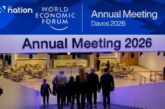
Dr. Arvind Kumar*
The Water Transversality Awards and Conclave 2024, held in New Delhi, successfully brought together stakeholders, experts, and decision-makers from both the government and private sectors. The two-day conference was organized by the India Water Foundation and supported by esteemed partners, including UNESCAP, Ministry of Jal Shakti, Ministry of Power, and Ministry of Social Justice and Empowerment.
Despite a sudden downpour, attendees showed their commitment to the cause, demonstrating the importance of addressing the intricate relationships between water, energy, and environment. The conference aimed to reframe the narrative around the water-energy-environment nexus through a transversality approach. The conference provided a platform for sharing knowledge and exploring new strategies to optimize water utility, energy production, environmental sustainability, and human development. The event consisted of four plenaries, two leaders’ forums, three high-level policy dialogues, and various sessions encompassing water, energy, health, net zero, decarbonisation, ecosystem adaptation and restoration, green hydrogen, renewable energy, and disaster risk management. Key partners for the event included Indian Oil, GAIL India, Oil India, BPCL, DFCCIL, HPCL, Dans group, WAPCOS, and Anondita Medicare. Knowledge partners included the World Water Council, GASP, IUCN, IHE DELFT, ISID, GIZ, ICID, UNOPS, and the Embassy of Israel.
The inaugural session started with welcoming the dignitaries on stage and a ceremonial lamp lighting ceremony by all the dignitaries, post which Dr. Arvind Kumar, President, India Water Foundation, officially launched the event with his welcome address. He laid out the objectives of the conclave, commenting that this would build the first iteration of the conference, forging the pathway to reframing the narrative around water, energy and environment nexus and changing the perspective to look at it as a resource in silos, starting with bringing it into an umbrella of nexus. This was followed by the addresses of the Guests of Honour on the dais. Ms. Mikiko Tanaka, Head, UNESCAP SSWA office made the special address, commenting that water is dynamic & transformative. For a developing nation like India, with its vast population, water must be central to all resource planning; while other addresses were given by Mr. Harsh Malhotra, Hon’ble Minister of state, Ministry of Corporate Affairs and Col. Akhilesh Kumar Pandey, Chief Post Master General, Delhi Circle. A special cover was also released by the India Post to commemorate this event. The honorable guests also released a book by Dr. Arvind Kumar, My Friday Musings, a compilation of his Friday Blog and they also presented a report on SDG 6 by Dr. Arvind Kumar of the ten countries of South and South West Asia region for the UN ESCAP. The Hon’ble minister congratulated Dr Arvind Kumar for this initiative of bringing 23 organizations on board to collaborate for this event.
The first session of the Water Transversality Awards and Conclave 2024 delved into the intricate relationships between water, energy, and environment. Moderated by esteemed experts, including Dr. Eddy Moors, Rector of IHE Delft, and Mr. Anshul Jai from the Indo Nordic Water Forum, the session facilitated a multidisciplinary dialogue. The discussion highlighted the importance of multistakeholder engagements in breaking down siloed thinking and recognizing the interconnectedness of the planet’s most critical resources. By fostering a collaborative approach, the session aimed to promote a deeper understanding of the water-energy-environment nexus and encourage innovative solutions to address the complex challenges facing our planet.
The conference featured several insightful sessions, starting with a plenary on water, where Ms. Archana Varma emphasized the need for climate-resilient agriculture to conserve water, particularly groundwater. U.P. Singh, former secretary of the Ministry of Textiles and Jal Shakti, presented his approach of 5 Rs: reduce, reuse, recycle, recharge, and respect the resource. The high-level policy dialogue on renewable energy, green hydrogen, and its impact on water and environment was another significant session. Mr. Rajan Sudesh Ratna, Deputy Head of SSWA UNESCAP, highlighted that most SDG goals, especially Goal 6, are regressing in India and South Asia. Dr. Rabi Mohtar, Governor of the World Water Council, stressed the need to develop a framework focusing on resource recovery and integrating circular economy principles.
Other notable sessions included multistakeholder partnerships for inclusive disaster risk management, where Dr. Ajeet Tyagi emphasized the importance of a holistic approach to disaster management. The session on water use efficiency in the industrial sector amidst the climate emergency featured insights from Ms. Laura Sustersic, Project Manager at GIZ, and Ms. Noa Amsalem, Water Attache at the Embassy of Israel, who shared Israel’s innovative approaches to addressing water scarcity.
Day 2 of the conference commenced with a plenary session on energy, where Mr. R K Pachnanda, former chairman of HERC, highlighted the transformative potential of renewable energy in meeting agricultural and household electricity needs. He also emphasized the interconnectedness of food, energy, and water. The subsequent session focused on interdisciplinary approaches to achieving energy and water sustainability. Mr. Sophearin Chea from the Mekong River Commission joined virtually, sharing insights on the Mekong River’s rejuvenation efforts. Other esteemed speakers, including Dr. Pech Sokhem and Ms. Ying Zhang, also contributed to the discussion.
A High-Level Policy Dialogue on decarbonization and net-zero energy sectors through water circularity followed, featuring Mr. Anshuman from TERI, who presented on the organization’s work in this area, including the Xylem project. The leadership dialogue on nexus governance emphasized the importance of multisectoral dialogues for a sustainable future. Sh Ram Mohan Mishra, Chairman of the Investment Promotion Board of Meghalaya, stressed the need to respect water as a resource and change our mindset. Sh Navneet Sehgal, Chairman of Prasar Bharti, highlighted the government’s initiatives, such as the Jal Jeevan Mission and Har Ghar Jal.
The conference also featured the presence of His Holiness Acharyashri Lokesh ji, who emphasized the importance of faith in guiding development towards a rightful direction. A plenary session on environment, chaired by Mr. Atul Bagai, former head of UNEP India, underscored the need for robust partnerships and collaborations to achieve sustainability. Dr. Nagesh Kumar, Director of ISID, emphasized the importance of incorporating community knowledge into development initiatives.
The High-Level Policy Dialogue on the environment, water, and health trilemma explored sustainable strategies for the future. Mr. Shahwaiz Siddiqui, Advocate at the Supreme Court of India, highlighted that the right to a healthy environment and access to water is enshrined as a fundamental right under Article 21 of the Indian Constitution. The final session focused on the environmental co-benefits of ecosystem restoration, providing a thought-provoking conclusion to the conference.
Sh. Raj Bhushan Chaudhary, Honourable Minister of State for Ministry of Jalshakti, graced the Valedictory and Awards Ceremony as the chief guest. The event saw the conferral of over 60 Water Transversality Global awards across various categories. These categories included Water Use Efficiency in Industrial Sector, Climate Resilient Agriculture Practices, Rain Water Harvesting and Ground Water Management, and Water Reuse and Treatment. The awards were bestowed upon organisations, districts, states, individuals, youth, and schools by the Honourable Minister. The ceremony was attended by Dr. Arvind Kumar and Ms. Mikiko Tanaka. In addition to the Water Transversality Global awards, leadership awards in the water, energy, and environment sector were also presented to esteemed organisations such as WAPCOS, DFCCIL, and GAIL India.
Water Transversality Awards and Conclave 2024 concluded with a strong sense of accomplishment and optimism for sustainability for future. The two day’s discussions and presentations provided a comprehensive overview of current challenges and innovative solutions in the field. Participants left with a renewed commitment to advancing sustainable practices and fostering collaborative efforts. The conference not only highlighted the importance of viewing water as a valuable resource but also set the stage for future initiatives and partnerships aimed at ensuring water security and environmental sustainability.
*Editor, Focus Global Reporter









